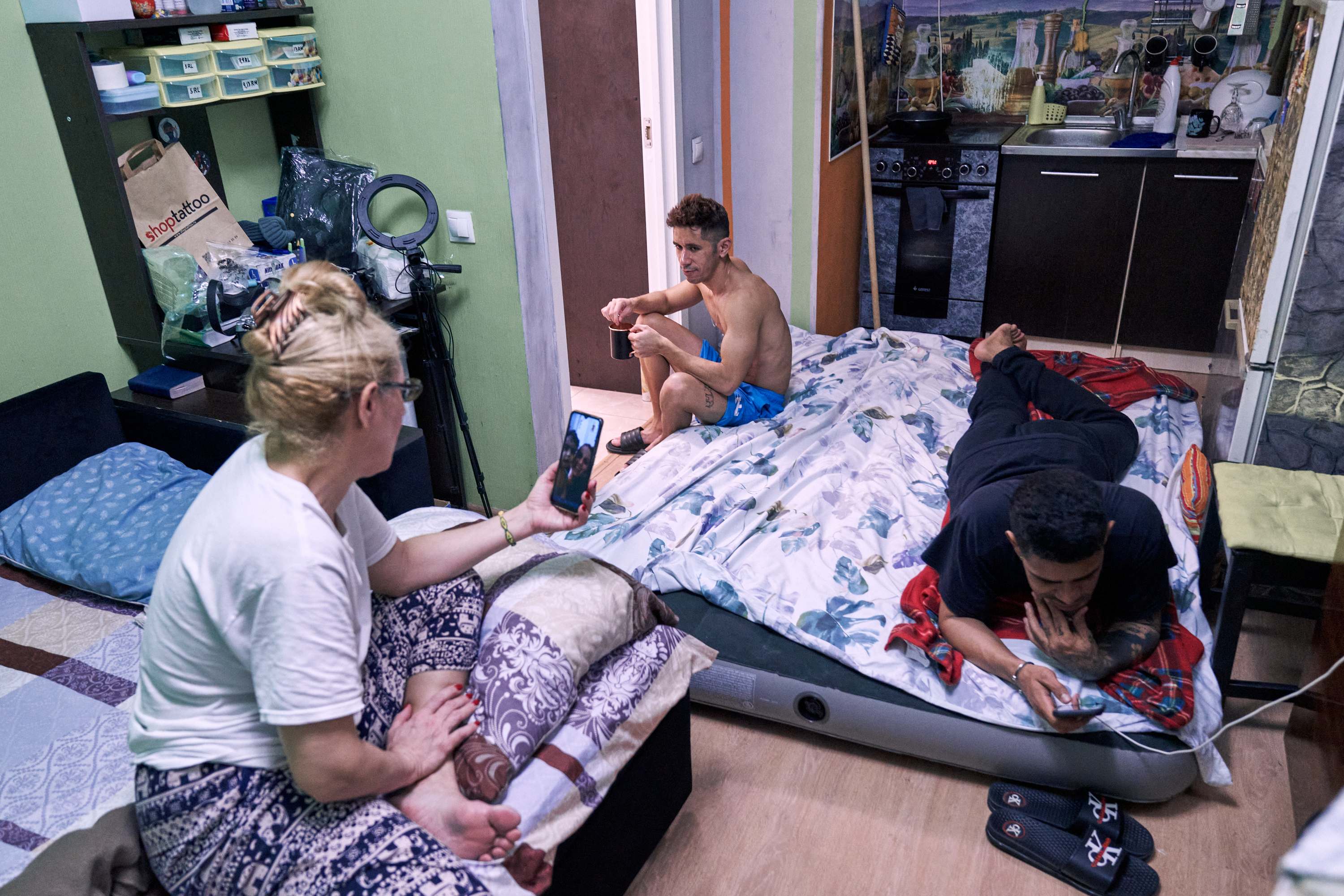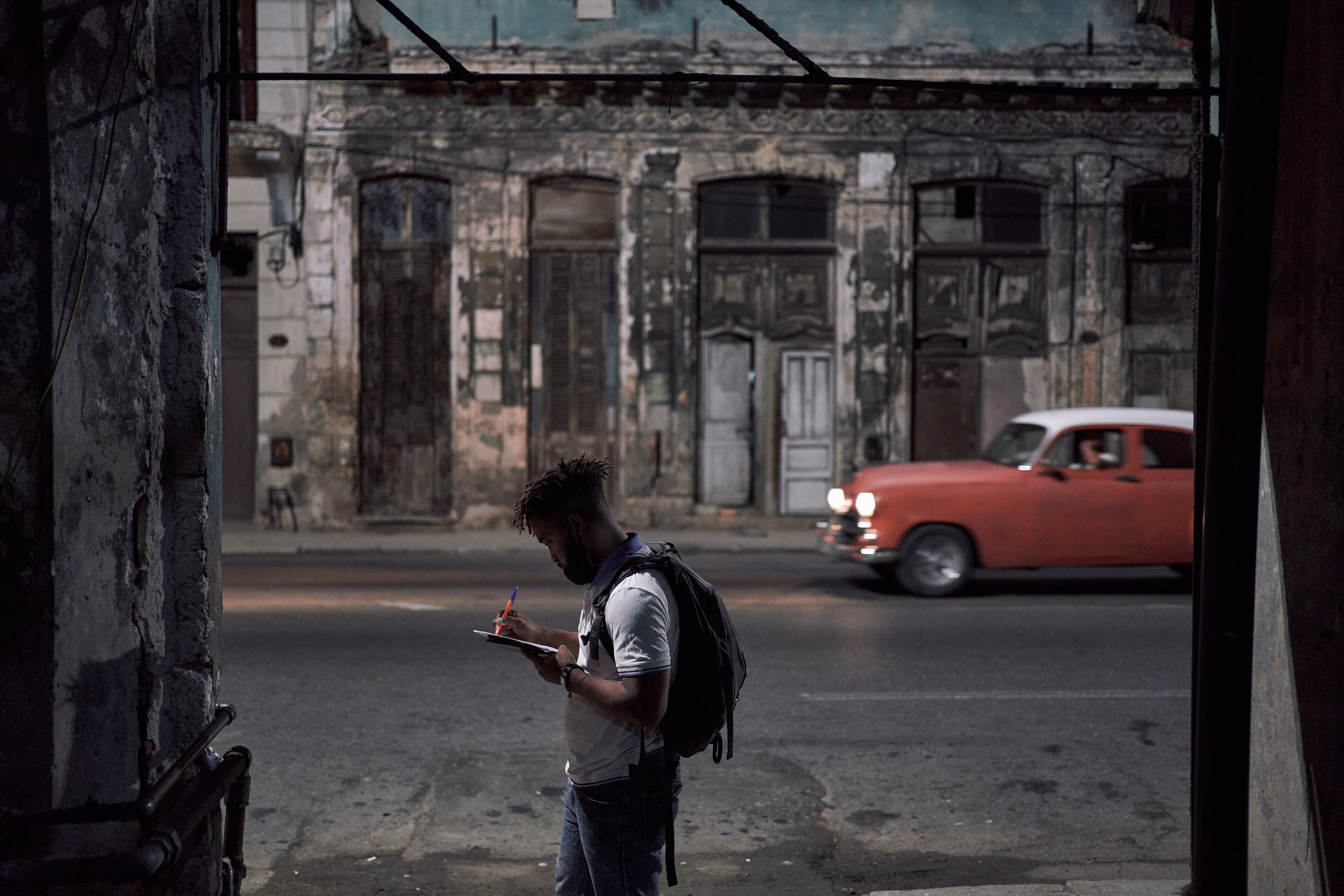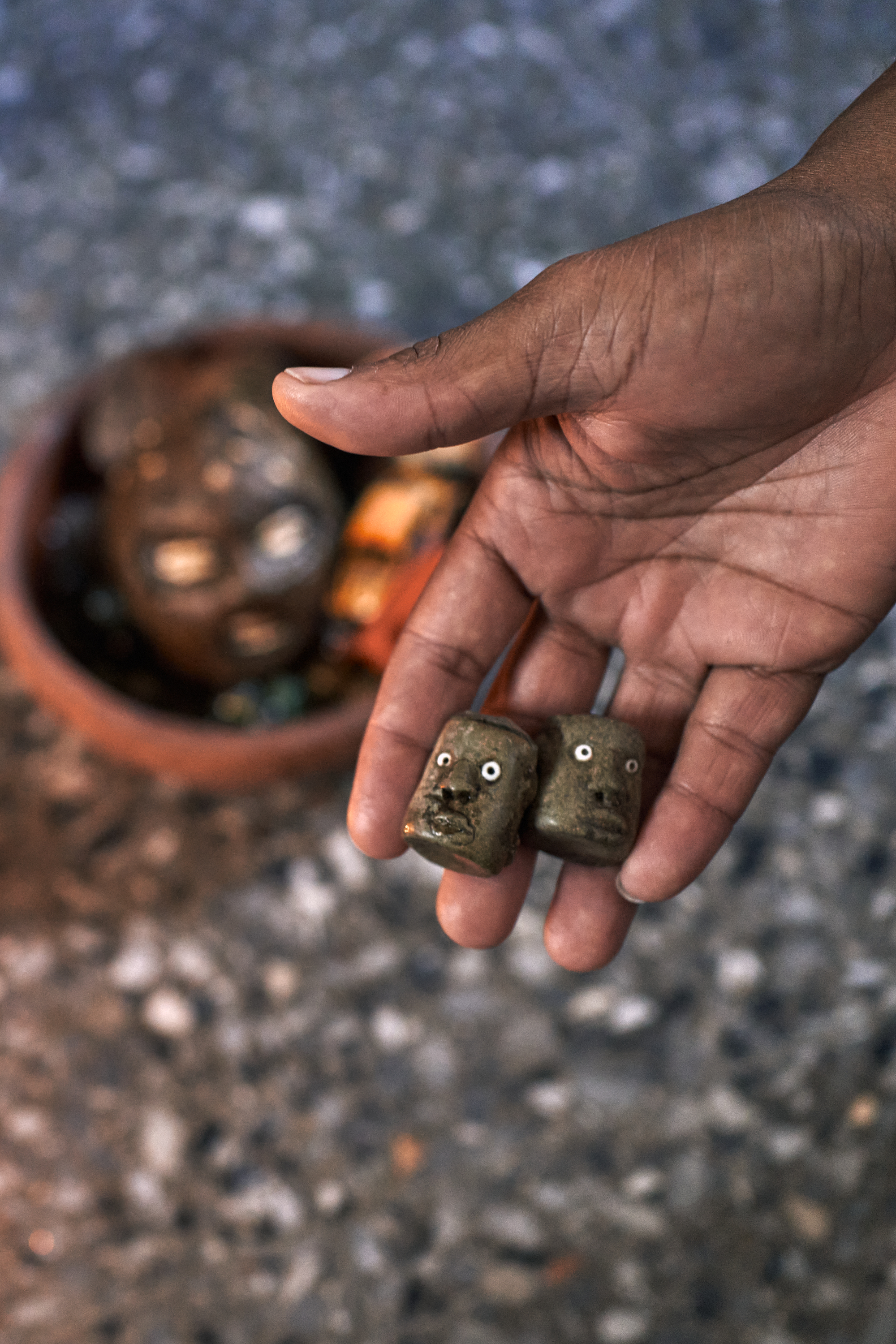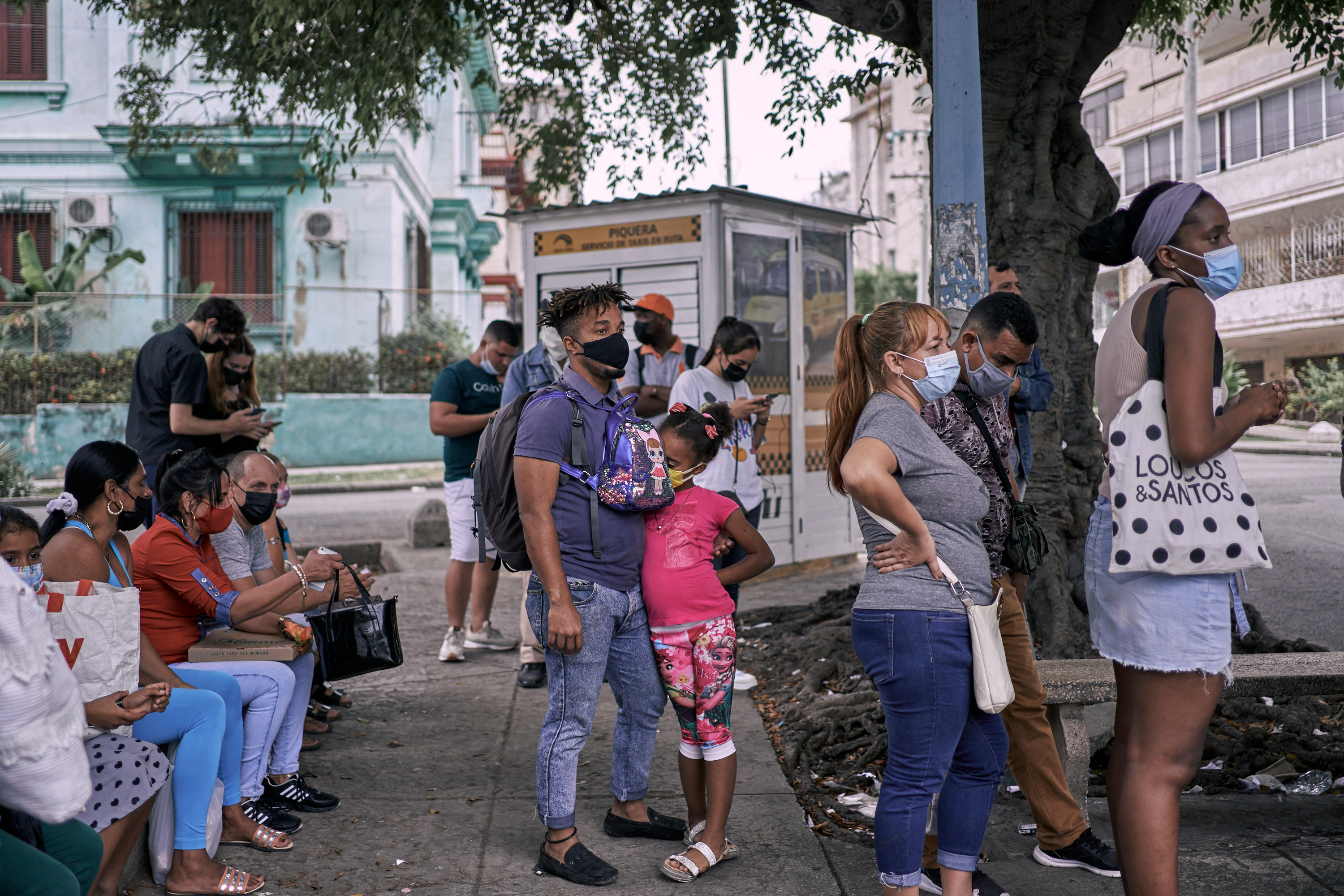The Cuban Youth Exodus
Cuba (2020-in process)
Exhibited as part of the 6th Latin American Foto Festival at the Bronx Documentary Center, New York
Cuba is experiencing a mass exodus. As a photographer based between Argentina and Cuba, every time I return to the island, more and more friends have left. A political and economic crisis further worsened by the impact of the Covid pandemic has left many Cubans feeling that they have no option but to leave their homeland to search for better opportunities abroad. Since 2020 I have been working on the effects of the migratory crisis that is rampantly hitting the country.
The Cuban Youth exodus approaches the migration crisis through the strong relationship of two friends, Maykel who has left to Moscow 2 years ago and Rayko who remains in Havana. During the pandemic, with airport closures and increased restrictions, Russia became one of the escape routes most used by Cubans. Every year, around 25,000 Cubans entered this country as tourists, according to data from the Russian Border Guard. Thanks to the agreement between Moscow and Havana, historical allies, they do not need a visa and can stay in the country for up to 90 days; just visiting, not working. Many, like Maykel, came to stay.
![]()
Rayko (33) hangs his freshly washed clothes on the balcony of his apartment in Central Havana, Cuba.
![]()
![]()
Marta, Maykel's mom, takes down an old photo of Maykel and Rayko placed in Maykel’s bedroom in Los Sitios neighborhood, Havana, Cuba.
![]()
Misaylovo sunset from Maykel’s apartment, Moscow, Russia.
![]()
Maykel is on the bus that takes him to the subway to deliver the meals he prepared for four Cubans who work in a call center. In Cuba, Maykel came to fulfill his dream of having a bar, but when the pandemic hit he had to close, like many others. When his friend Hatri told him that she was in Moscow and that she would receive him in her apartment, he did not hesitate. He borrowed some money from a French friend and got the rest by buying and selling merchandise. He arrived in Moscow in a hot August. "I am very afraid of the cold."
![]()
Maykel makes a video call with Rayko while on the bus to deliver meals to other Cubans in Central Moscow, on November 10, 2021. Before Russia invaded Ukraine, Maykel invited him to join it. Now that is not a possibility.
![]()
Rayko buys the regulated items of the month at the “bodega” in Centro Habana, Cuba, on February 8, 2022. The government has a distribution system for certain basic products such as rice, beans, oil, and coffee. Through a supply notebook, people can access a certain amount of these products at low cost each month. However, these are not enough to cover the monthly demand of a family, so you have to buy either in stores in MLC (dollar) or on the street at resale price.
![]()
Maykel buys food in a store in the neighborhood where he lives on the outskirts of Moscow. For him, food is the main improvement in the quality of life outside of Cuba. He carefully analyzes prices and buys the cheapest. Meal expenses are shared among all housemates. "I've never seen so many different things, I want to try everything." Consumption is mainly of processed and pre-manufactured products, sugary drinks and sweets.
![]()
A calendar with Fidel Castro pictures hangs in Rayko’s kitchen at his apartment in Centro Havana, Cuba.
![]()
Rayko drinks a coffee as his seven years old daughter Africa eats lunch in a cafe in Havana, Cuba. “The days I spend with her we walk around, I don’t have money to take her out. She sees things that she wants me to buy for her but I cant afford them. I would like to live in other country to work and make some money and then come back to Cuba to open a business here. I've never wanted to leave before. I just want to work.”
![]()
A photo of a 6 years old Maykel hangs in the wall of his room where he used to live with his mom and dad in law in Los Sitios neighborhood, Havana, Cuba. He left home in August 2021 but his mother kept his room as he left it.
![]()
Maykel drinks tea while his housemates talk to relatives in Cuba, on November 12, 2021. The living room / kitchen of the apartment becomes another room at night. Odalys and Maykel share the sofa bed and Walter sleeps on an inflatable mattress that he accommodates on the floor. The only room in the apartment is occupied by the couple, Hatri and Yandy
![]()
Rayko checks the addresses of the neighbors he has to visit during his working night tour in Centro Havana , on October 6, 2021
![]()
Rayko shows two Eleguá, represented in the Yoruba religion as the owner of the roads and paths, as well as controller of the destination. He asks Eeleguá to open his roads and helps him get a better future.
![]() An eagle with open wings, first marking of a tatto made by Walter, Maykel's roomate in Moscow, Russia.
An eagle with open wings, first marking of a tatto made by Walter, Maykel's roomate in Moscow, Russia.
![]()
Rayko hugs her mother at her home in the Vedado neighborhood.
![]()
Rayko waits for the bus to take his daughter Africa back home. “If I could leave Cuba to other country I would save up money to bring my daughter and her mom with me.”
![]()
Rayko conforts his daughter Africa as she doesn’t want him to leave.
![]() Rayko's bed, Havana, Cuba.
Rayko's bed, Havana, Cuba.
Exhibited as part of the 6th Latin American Foto Festival at the Bronx Documentary Center, New York
Cuba is experiencing a mass exodus. As a photographer based between Argentina and Cuba, every time I return to the island, more and more friends have left. A political and economic crisis further worsened by the impact of the Covid pandemic has left many Cubans feeling that they have no option but to leave their homeland to search for better opportunities abroad. Since 2020 I have been working on the effects of the migratory crisis that is rampantly hitting the country.
The Cuban Youth exodus approaches the migration crisis through the strong relationship of two friends, Maykel who has left to Moscow 2 years ago and Rayko who remains in Havana. During the pandemic, with airport closures and increased restrictions, Russia became one of the escape routes most used by Cubans. Every year, around 25,000 Cubans entered this country as tourists, according to data from the Russian Border Guard. Thanks to the agreement between Moscow and Havana, historical allies, they do not need a visa and can stay in the country for up to 90 days; just visiting, not working. Many, like Maykel, came to stay.

Rayko (33) hangs his freshly washed clothes on the balcony of his apartment in Central Havana, Cuba.

Maykel (30) looks out the window of the apartment he shares with four other Cubans in the Misaylovo neighborhood, a micro-district on the outskirts of Moscow, on November 10, 2021. These Soviet-type buildings are reminiscent of the so-called microbrigades in Cuba, built in the early years of the Revolution. Maykel arrived in Russia in August and hopes that Rayko can join him at some point. “If I had the money, I would pay for the flight so that he could come tomorrow”, he said before Russia's war against Ukraine broke out, which led to the cancellation of all flights as the airspace is blocked for Russian airlines.

Marta, Maykel's mom, takes down an old photo of Maykel and Rayko placed in Maykel’s bedroom in Los Sitios neighborhood, Havana, Cuba.

Misaylovo sunset from Maykel’s apartment, Moscow, Russia.

Maykel is on the bus that takes him to the subway to deliver the meals he prepared for four Cubans who work in a call center. In Cuba, Maykel came to fulfill his dream of having a bar, but when the pandemic hit he had to close, like many others. When his friend Hatri told him that she was in Moscow and that she would receive him in her apartment, he did not hesitate. He borrowed some money from a French friend and got the rest by buying and selling merchandise. He arrived in Moscow in a hot August. "I am very afraid of the cold."

Maykel makes a video call with Rayko while on the bus to deliver meals to other Cubans in Central Moscow, on November 10, 2021. Before Russia invaded Ukraine, Maykel invited him to join it. Now that is not a possibility.

Rayko buys the regulated items of the month at the “bodega” in Centro Habana, Cuba, on February 8, 2022. The government has a distribution system for certain basic products such as rice, beans, oil, and coffee. Through a supply notebook, people can access a certain amount of these products at low cost each month. However, these are not enough to cover the monthly demand of a family, so you have to buy either in stores in MLC (dollar) or on the street at resale price.

Maykel buys food in a store in the neighborhood where he lives on the outskirts of Moscow. For him, food is the main improvement in the quality of life outside of Cuba. He carefully analyzes prices and buys the cheapest. Meal expenses are shared among all housemates. "I've never seen so many different things, I want to try everything." Consumption is mainly of processed and pre-manufactured products, sugary drinks and sweets.

A calendar with Fidel Castro pictures hangs in Rayko’s kitchen at his apartment in Centro Havana, Cuba.

Rayko drinks a coffee as his seven years old daughter Africa eats lunch in a cafe in Havana, Cuba. “The days I spend with her we walk around, I don’t have money to take her out. She sees things that she wants me to buy for her but I cant afford them. I would like to live in other country to work and make some money and then come back to Cuba to open a business here. I've never wanted to leave before. I just want to work.”

A photo of a 6 years old Maykel hangs in the wall of his room where he used to live with his mom and dad in law in Los Sitios neighborhood, Havana, Cuba. He left home in August 2021 but his mother kept his room as he left it.

Maykel drinks tea while his housemates talk to relatives in Cuba, on November 12, 2021. The living room / kitchen of the apartment becomes another room at night. Odalys and Maykel share the sofa bed and Walter sleeps on an inflatable mattress that he accommodates on the floor. The only room in the apartment is occupied by the couple, Hatri and Yandy

Rayko checks the addresses of the neighbors he has to visit during his working night tour in Centro Havana , on October 6, 2021

Rayko shows two Eleguá, represented in the Yoruba religion as the owner of the roads and paths, as well as controller of the destination. He asks Eeleguá to open his roads and helps him get a better future.
 An eagle with open wings, first marking of a tatto made by Walter, Maykel's roomate in Moscow, Russia.
An eagle with open wings, first marking of a tatto made by Walter, Maykel's roomate in Moscow, Russia.
Rayko hugs her mother at her home in the Vedado neighborhood.

Rayko waits for the bus to take his daughter Africa back home. “If I could leave Cuba to other country I would save up money to bring my daughter and her mom with me.”

Rayko conforts his daughter Africa as she doesn’t want him to leave.
 Rayko's bed, Havana, Cuba.
Rayko's bed, Havana, Cuba.[spanish]